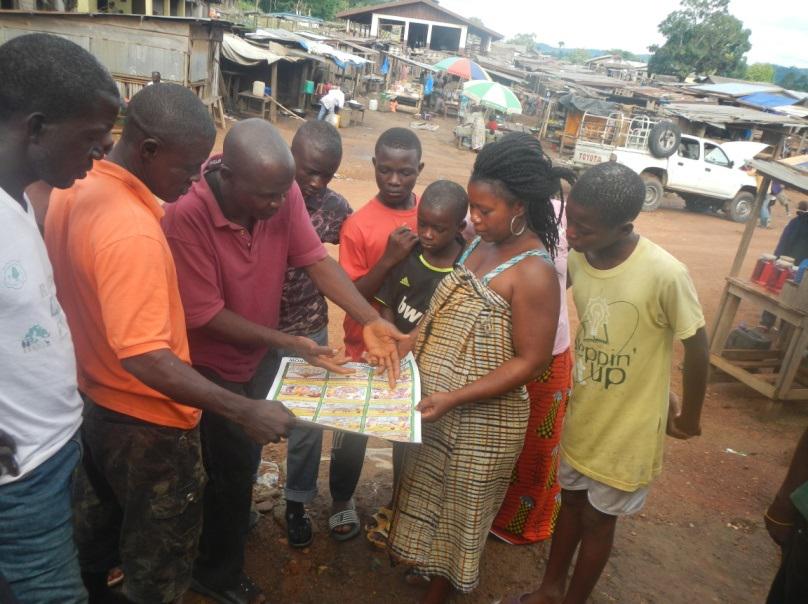Peter Mulbah
Other projects
26 Mar 2008
Environmental Conservation Outreach Programme Focusing on Youths around the East Nimba Nature Reserve (ENNR), Nimba County, Liberia
2 Oct 2009
The Development of an Integrated Youth Environmental Rights and Education Outreach Program in Communities Around the Wonegizi Proposed Protected Area in Lofa County
18 Jan 2013
The Continuation of the Wonegizi Youth Environmental Rights Awareness & Educational Training Program, Ziama Clan, Lofa County, Liberia
The overall goal of this project is to increase the Knowledge, Change Altitude and Practice (KAP) of youth regarding the conservation and protection of their environment, and how they can sustainably manage it resources as Liberia’s future leaders.

Mr. Sekou Kelleh, SADS Field Officer raising environmental awareness at Konia Market center.
The developed SADS environmental conservation training program is comprised of three lessons which are developed to with specific focus on youth in forest dependent communities, which SADS intend to pilot in three communities in Ziama Clan. The major strategy for the implementation of this program is the developing of environmental education teaching aids materials (i.e., booklets) that provide visuals explanations to issues discussed throughout the lessons. The content of these teaching aids materials has been designed in consultation and collaboration with targeted youth and other environmental and conservation organizations in Liberia and incorporate visual aids productions that reflect and explain issues at the rural certain. During this process, for example, the drivers of deforestation that were identified by the youths in the previous project will be highlighted in order to ensure that it serve as a reminder, and a form part of the teaching materials for youth- to- youth discussion. This in addition to lessons will challenge youths to behave in an environmentally friendly and responsible manner. The lifeline to ensuring long term environmental and natural resources management sustainability in Liberia depend on the education of Liberian youths as the centre part of the process. If youth are trained to ensue sound and responsible environmental behaviour properly, the fabric of natural resource in Liberia will continuously remain threaten. SADS is currently implementing an environmental education program known as the GREEN FORUM in three secondary schools with Funding supports from Conservation International. This program has provided the platform through which youths and students can willingly participate and contribute toward environmental problems/ issues in Liberia, and SADS intend to use the lessons learned to strengthen the implementation of this program.
The major activities of this project are as follows:
Establishment of Wonegizi Environmental Nature Club: SADS will facilitate the establishment of three environmental nature clubs within three pilot communities. These club memberships will specifically focus on rural youths especially those whose activities threaten the Wonegizi proposed protected forest. These local youth will be trained to serve as a conduit through which other young people including their parents can be educated on how to protect, conserve and sustainable manage their environment especially the Wonegizi forest for their future generation. This activity is expected to run through the end of the project life span. The primary roles of these nature clubs will be to engage students and other youths on how they could positively change their behaviour to a more environmentally friendly, through individual’s lifestyles and livelihood activities. These nature clubs will use several medium like campus and community peer group lecture series, multi- media (video show) information sharing and posters publicity for informing and educating other young people. Production of environmental education teaching aids materials: SADS will design and produce teaching materials including posters and picture books on relevant environmental topics and will be distributed to target beneficiary audiences and other natural resource user groups during teaching sessions. SADS will ensure that the subject matter in the teaching materials overlaps with topics written in the environmental education program to ensure maximum opportunity for learning and reinforcement of information provided.
In addition, SADS will also design and produce T- shirt for each of the nature clubs and will be use as tool of publicity and awareness of the existence of the nature clubs in each community, while encouraging youth to get involve. Train Environmental Education Team: SADS will hire and train environmental education persons preferably community school science teachers together with members of the Nature club in each of the pilot communities in group management, financial transparency and accountability, and public speaking skills. The team will gradually oversee the responsibility of leading teaching sessions and providing guidance to the entire program in their respective communities. This will ensure local ownership and long-term sustainability of the program.